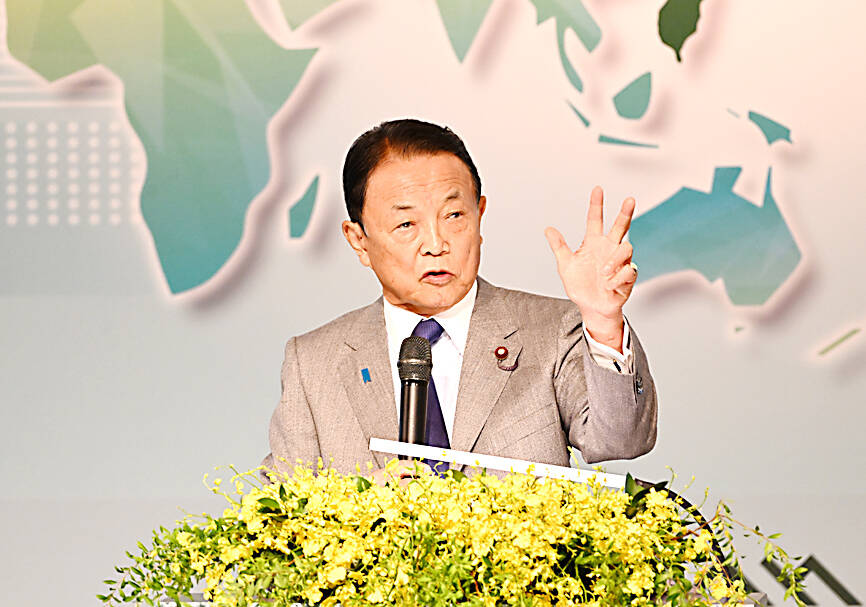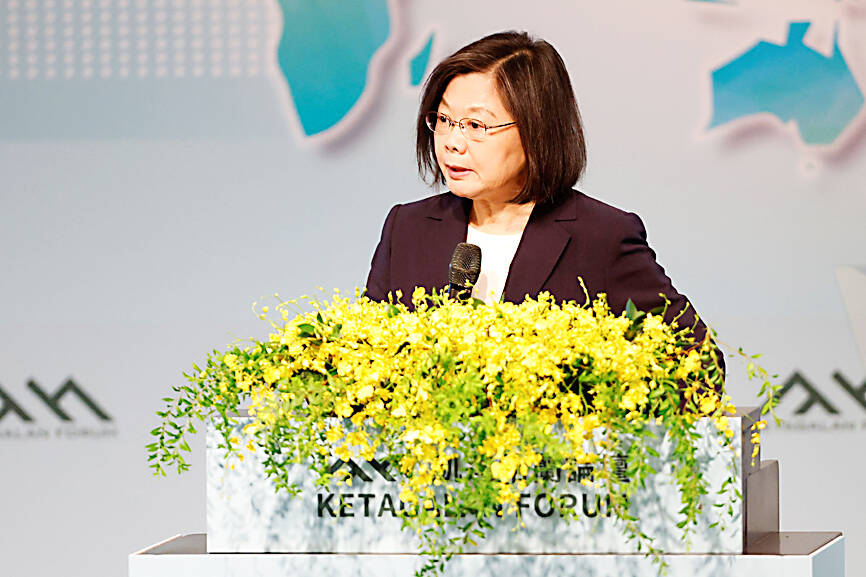The international community must “wake up” to the worsening situation in the Taiwan Strait, former Japanese prime minister Taro Aso said yesterday in Taipei, as he reiterated the importance of peace and stability and called for concrete action to safeguard it, such as stepping up defense capabilities.
The world is gradually tilting toward a period of emergency, as global security, information and cognitive warfare, and economic security challenges are becoming more substantial, Aso said in a speech at the Ketagalan Forum.
The forum, an annual event focused on security in the Indo-

Photo: Tien Yu-hua, Taipei Times
Pacific region, was also attended by President Tsai Ing-wen (蔡英文).
“The fact that these issues can be discussed in Taipei already shows the importance of the role that Taiwan plays,” said Aso, vice president of Japan’s ruling Liberal Democratic Party.
Aso said that while he was serving as foreign minister in former Japanese prime minister Shinzo Abe’s administration, the Japanese government “attached great importance to our relations with Taiwan.”

Photo: Carlos Garcia Rawlins, Reuters
“Taiwan is an extremely important partner and friend, which shares universal values, such as freedom, democracy, basic human rights and the rule of law” with Japan, he said.
The two sides have formed close economic relations and people-to-people ties, he added.
Abe in 2016 proposed a free and open Indo-Pacific vision as Japan’s foreign policy, and it has been widely recognized by the international community, Aso said.
In March, Japanese Prime Minister Fumio Kishida announced a new plan to promote a free and open Indo-Pacific region during a trip to India, which “clearly expresses support for freedom and respect for diversity, inclusiveness and openness,” Aso said.
The importance of cross-strait peace and stability has been repeatedly stressed at an international level, such as in the Japan-US Joint Leaders’ Statement issued in April 2021 and the G7 summit communiques published in June 2021 and in May, he said.
G7 leaders, who gathered in Hiroshima, Japan, in May, also said that concerns and worries should be expressed to China clearly and directly in the hopes of establishing a constructive and stable relationship with Beijing, Aso said.
He added that Japan “will make use of all opportunities” to continue to stress the importance of regional peace and stability.
“The most important thing for us is that there should be no war in our region, including the Taiwan Strait,” he said.
Enhancing deterrence is therefore crucial, including by improving self-defense capabilities, having the will to defend oneself and conveying these two to the opponent, he said.
Aso called on like-minded countries, such as Taiwan, Japan and the US, to “wake up now,” saying it is time to focus on full deterrence.
Japan is “making dramatic political changes” to bolster its defense capabilities, such as by approving the “three security documents” at the end of last year, acquiring long-range missiles and increasing its defense budget, he said.
The updated National Security Strategy underlines for the first time the importance of peace and stability across the Taiwan Strait, Aso said.
Through these practical actions, Japan can contribute to security and stability in the region and prevent war, he said.
As for Taiwan, “the people of Taiwan should have a determined will” to defend their sovereignty, as well as to maintain the nation’s prosperity, he said.
Countries around the world should also come together to improve economic resilience and economic security by countering malicious business practices, he said.
The Comprehensive and Progressive Agreement for Trans-Pacific Partnership is a platform that can help with that effort, he said.
Japan has always supported Taiwan joining the partnership, he said.
He called on international society to support Taiwan’s participation in international organizations, as “Taiwan can play a very important role and share [its] experiences with the world,” as it has shown in its successful handling of the COVID-19 pandemic.
Tsai said that she does not take the support of Taiwan’s security partners for granted.
“While we don’t seek military confrontation and hope for a peaceful, stable and beneficial coexistence with our neighbors, Taiwan is always ready to defend its democracy and way of life,” the president said.
Later yesterday, Aso attended a luncheon hosted by Vice President William Lai (賴清德) and met Tsai at the Presidential Office in Taipei.
Friends stick with each other in good times and bad, he said during the meeting with Tsai, adding that he hoped trust and relations between Japan and Taiwan would continue to deepen.
Additional reporting by AFP

NATIONAL SECURITY THREAT: An official said that Guan Guan’s comments had gone beyond the threshold of free speech, as she advocated for the destruction of the ROC China-born media influencer Guan Guan’s (關關) residency permit has been revoked for repeatedly posting pro-China content that threatens national security, the National Immigration Agency said yesterday. Guan Guan has said many controversial things in her videos posted to Douyin (抖音), including “the red flag will soon be painted all over Taiwan” and “Taiwan is an inseparable part of China,” while expressing hope for expedited “reunification.” The agency received multiple reports alleging that Guan Guan had advocated for armed reunification last year. After investigating, the agency last month issued a notice requiring her to appear and account for her actions. Guan Guan appeared as required,

Japan and the Philippines yesterday signed a defense pact that would allow the tax-free provision of ammunition, fuel, food and other necessities when their forces stage joint training to boost deterrence against China’s growing aggression in the region and to bolster their preparation for natural disasters. Japan has faced increasing political, trade and security tensions with China, which was angered by Japanese Prime Minister Sanae Takaichi’s remark that a Chinese attack on Taiwan would be a survival-threatening situation for Japan, triggering a military response. Japan and the Philippines have also had separate territorial conflicts with Beijing in the East and South China

A strong cold air mass is expected to arrive tonight, bringing a change in weather and a drop in temperature, the Central Weather Administration (CWA) said. The coldest time would be early on Thursday morning, with temperatures in some areas dipping as low as 8°C, it said. Daytime highs yesterday were 22°C to 24°C in northern and eastern Taiwan, and about 25°C to 28°C in the central and southern regions, it said. However, nighttime lows would dip to about 15°C to 16°C in central and northern Taiwan as well as the northeast, and 17°C to 19°C elsewhere, it said. Tropical Storm Nokaen, currently

PAPERS, PLEASE: The gang exploited the high value of the passports, selling them at inflated prices to Chinese buyers, who would treat them as ‘invisibility cloaks’ The Yilan District Court has handed four members of a syndicate prison terms ranging from one year and two months to two years and two months for their involvement in a scheme to purchase Taiwanese passports and resell them abroad at a massive markup. A Chinese human smuggling syndicate purchased Taiwanese passports through local criminal networks, exploiting the passports’ visa-free travel privileges to turn a profit of more than 20 times the original price, the court said. Such criminal organizations enable people to impersonate Taiwanese when entering and exiting Taiwan and other countries, undermining social order and the credibility of the nation’s